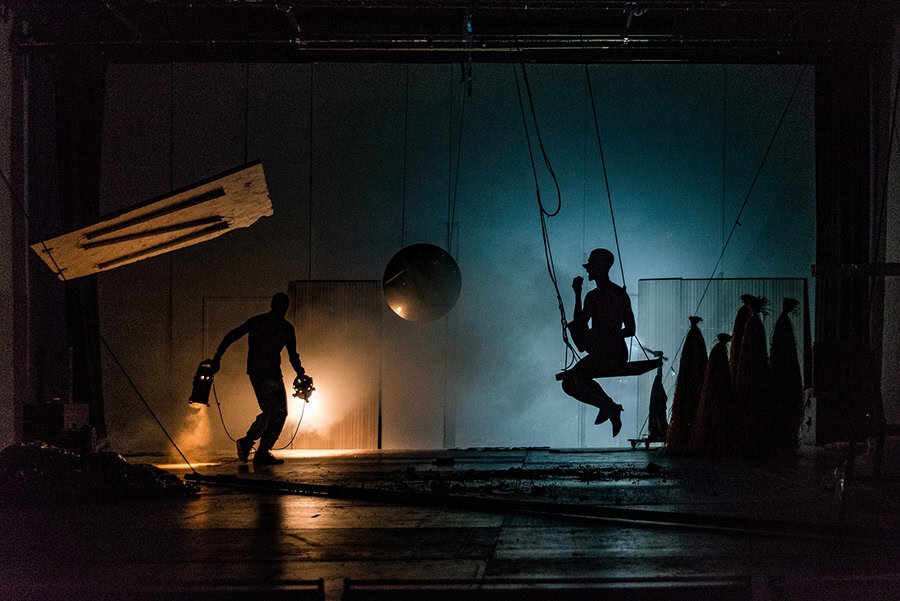Euripides Laskaridis, Titans, The Coronet Theatre
Posted: March 25th, 2023 | Author: Nicholas Minns & Caterina Albano | Filed under: Performance | Tags: Coronet Theatre, Dimitris Matsoukas, Dimitris Papaioannou, Euripides Laskaridis, Robert Wilson | Comments Off on Euripides Laskaridis, Titans, The Coronet TheatreEuripides Laskaridis, Titans, The Coronet Theatre, March 3, 2023

With the announcement of their Spring season 2023, The Coronet Theatre has added to its reputation as a venue with some of the most eclectic and interesting dance and movement works in London. First up is Euripides Laskaridis’s Titans, a ‘bold and absurd fable blending dance and performance art…’ Laskaridis has worked previously with Dimitris Papaioannou and Robert Wilson from whom he has picked up not only ideas about craft but a love of Greek mythology. He has also learned from Papaioannou to use props in a surreal way to help unfold a free-flowing narrative, but he has taken it a step further in Titans in that he uses props as the narrative and as instruments of their own mythmaking.
There was a palpable anticipation in the first night audience who packed into the auditorium at the last minute in front of a dimly visible stage area littered with sundry props and scenic elements that seemed to relish a silent chaos of its own. The program note sets the action ‘before the world’s beginning’ — a time where all mythology belongs — and goes on to describe a place where ‘two solitary beings live between darkness and light, playing an endless game with no apparent purpose.’ This is a reduction of the original twelve Titans who in Greek mythology were the children of Uranus and Gaia, a parricidal offspring whose infighting led to a ten-year war with the Olympians. Laskaridis’ interest in the myth seems less in its detail than in searching for its contemporary resonances. Of the two solitary beings, one (Dimitris Matsoukas) is a hooded, dark-clad figure who merges into the dark surroundings or is seen in silhouette manipulating props, and the other is a grotesque vision inhabited by Laskaridis himself as a ludic provocateur, teasing us with technology that affects everything from the lights to his own amplified, high-pitched voice.
Laskaridis has spoken in an interview about his need to distance himself from his theatrical alter-ego by using masks, and in Titans his mask is his entire body: a pink-skinned being with a large forehead, a long up-turned nose and a pot belly. His legs and feet, often in heels, complete the aspect of a cross-dressing agent of a mythical world in a constant process of revolution, a revolution inspired by whimsy, caprice and volatility and fuelled by a magic white dust. In this kind of world, extrapolated through a vivid imagination, any purpose in the endless games and ruses these two characters play — or even in the relationship between them — is hard to discern except for the palpable sense of enjoyment in their theatrical effect, a relish in the possibilities they unleash. But like the mythical language Laskaridis employs as an extension of his physical gestures, the focus of Titans is essentially inwards, an existential whirlpool that draws the action in on itself in a never-ending spiral of self-absorption. Is this perhaps Titans’ reflection on our current zeitgeist?
One can sense the end approaching as Laskaridis ratchets up the turbulence by setting all the suspended props in motion — how he avoids them as he dances around the stage is a brave piece of choreography in itself — accompanied by a faux Hollywood film score that in turn ratchets up the emotional effect. It’s a magical moment where everything implausibly seems to coalesce, where the possibilities of a conclusion (and Titans is nothing if not a medium of possibilities) remain in mid-flight. The ending, by contrast, feels oddly contrived as Laskaridis, collapsed in the corner with the artificial flowers and the pedal bin sprinkler, takes Matsoukas into his arms like the image of an instant Pietà. It’s as if Laskaridis has lost control of the forces he has unleashed in Titans and has imposed, with mischievous humour, a recognisable image of spiritual acquiescence like a white flag of surrender.
The benefit of Laskaridis’ approach to theatre is the constant sensory provocation of an imagination let loose on effect, although theatrical overload is never far from the surface of Titans; one episode of prop manipulation follows another, searching for a meaning that constantly eludes us. But it’s a brilliantly achieved stage performance, both by the performers and the entire stage and production team. Hard-hitting may be a publicity term for emotionally provocative work, but with Titans it takes on another, more literal meaning: the raw physical aspect of material excess.